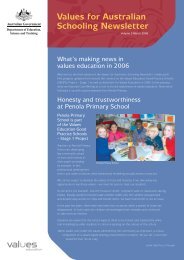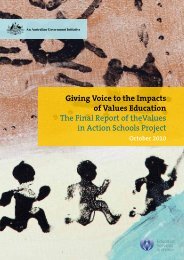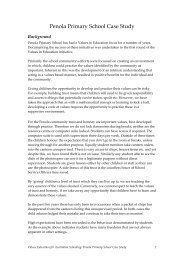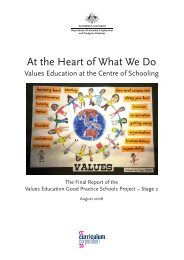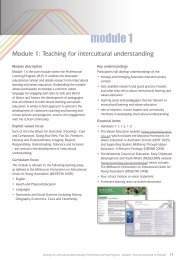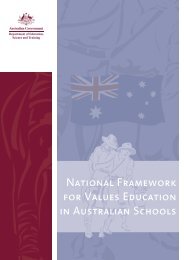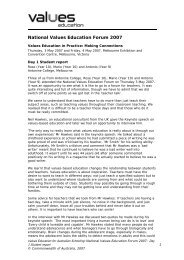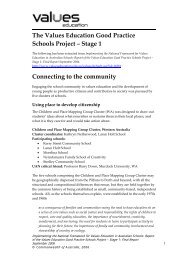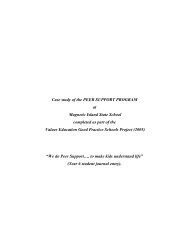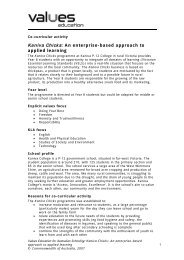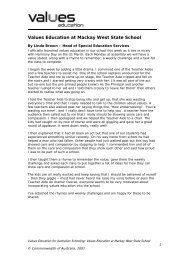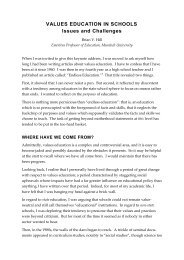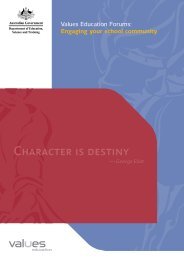Giving Voice to the Impacts of Values Education The Final Report of ...
Giving Voice to the Impacts of Values Education The Final Report of ...
Giving Voice to the Impacts of Values Education The Final Report of ...
Create successful ePaper yourself
Turn your PDF publications into a flip-book with our unique Google optimized e-Paper software.
Maroondah <strong>Education</strong> Coalition<br />
Vic<strong>to</strong>ria<br />
Youth <strong>Voice</strong>: Fostering Inclusiveness,<br />
Respect and Tolerance<br />
Participating schools<br />
• Ringwood Secondary College<br />
• Parkwood Secondary College<br />
• Maroondah Secondary College<br />
Cluster Coordina<strong>to</strong>r: Mrs Lyn McGoldrick, Ringwood Secondary College, Melbourne<br />
Deputy Coordina<strong>to</strong>r: Mrs Val Morelli, Parkwood Secondary College, Melbourne<br />
University Advisor: Dr Libby Tudball, Monash University<br />
<strong>The</strong> project<br />
<strong>The</strong> Maroondah <strong>Education</strong> Coalition comprises<br />
a subset <strong>of</strong> a well-established network <strong>of</strong><br />
government secondary schools in Melbourne’s<br />
outer eastern suburbs that have been working<br />
<strong>to</strong>ge<strong>the</strong>r since 2005. <strong>The</strong> three schools that<br />
participated in <strong>the</strong> Youth <strong>Voice</strong>: Fostering<br />
Inclusiveness, Respect and Tolerance project<br />
are situated approximately three kilometres<br />
apart, and <strong>the</strong>ir students access common<br />
community and cultural amenities. <strong>The</strong> schools<br />
are, none<strong>the</strong>less, characterised by very different<br />
student cohorts. Many Burmese, Sudanese and<br />
Liberian refugee families have recently come <strong>to</strong><br />
live in <strong>the</strong> area, which previously had a largely<br />
monocultural community. Staff at <strong>the</strong> three<br />
schools believed <strong>the</strong>re was a growing need <strong>to</strong><br />
develop students’ understanding <strong>of</strong> refugees and<br />
build positive relationships between members <strong>of</strong><br />
different cultures. <strong>The</strong> project was recognised as<br />
a meaningful way <strong>to</strong> support student wellbeing<br />
and facilitate students’ awareness, development<br />
and practice <strong>of</strong> <strong>the</strong>ir personal values. A key<br />
objective <strong>of</strong> <strong>the</strong> project was <strong>to</strong> establish a sense<br />
<strong>of</strong> community that embraced <strong>the</strong> whole school,<br />
parents and <strong>the</strong> local neighbourhood.<br />
<strong>The</strong> project drew on <strong>the</strong> National Framework<br />
for <strong>Values</strong> <strong>Education</strong> in Australian Schools (DEST<br />
2005) in addition <strong>to</strong> o<strong>the</strong>r national and Vic<strong>to</strong>rian<br />
initiatives focused on action research, social<br />
inclusion, <strong>to</strong>lerance and student wellbeing.<br />
<strong>The</strong> cluster embedded values education across <strong>the</strong><br />
three school communities using a multi-layered<br />
approach. Teacher pedagogy and practice was<br />
developed through a common values language<br />
and explicit projects, including excursions and<br />
group work around <strong>the</strong> <strong>the</strong>mes <strong>of</strong> inclusiveness,<br />
respect, <strong>to</strong>lerance and empowerment <strong>of</strong> <strong>the</strong><br />
voice <strong>of</strong> youth. One school ran a radio program<br />
with an emphasis on <strong>to</strong>lerance and intercultural<br />
understanding. A second school produced a<br />
student run magazine, Youth <strong>Voice</strong>, which<br />
featured artistic and written contributions<br />
from students that described how <strong>the</strong> project<br />
had changed <strong>the</strong>ir attitudes <strong>to</strong> cultural and<br />
racial difference.<br />
<strong>The</strong> teacher pedagogy and practice was<br />
underpinned by a substantial pr<strong>of</strong>essional<br />
learning program for all participants. <strong>The</strong><br />
cluster ran a pilot program for parents, teachers<br />
and students, facilitated by Dr Karen Hansen<br />
(Swinburne University), which had a particular<br />
emphasis on focused emotional intelligence. This<br />
program aimed <strong>to</strong> enhance teacher effectiveness<br />
in <strong>the</strong> classroom in order <strong>to</strong> improve student<br />
outcomes, both academically and socially, and <strong>to</strong><br />
encourage students <strong>to</strong> challenge <strong>the</strong>ir own and<br />
o<strong>the</strong>rs’ preconceptions about refugees.<br />
In addition <strong>to</strong> <strong>the</strong> pr<strong>of</strong>essional learning around<br />
emotional intelligence, <strong>the</strong> cluster organised three<br />
targeted, cross-school and community activities.<br />
Section 3: Accounts <strong>of</strong> <strong>the</strong> VASP cluster projects<br />
99



